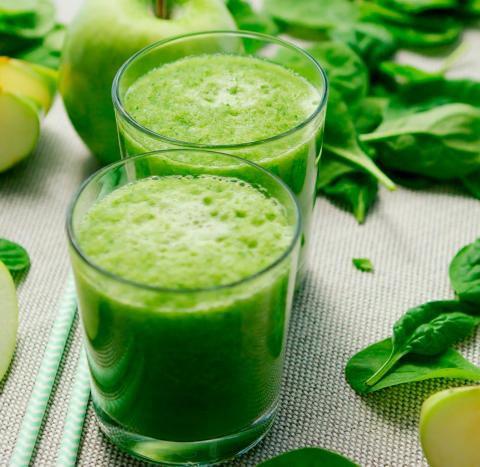You might find that ovarian cancer and/or your treatment have made you want to eat less. It might have changed the way things taste and the foods that you want to eat. These are common and there are things you can do to help.
Ask your medical team if you have any concerns or want to know more about what diet is right for you. You can also speak to one of our specialist nurses on the support line.
Common eating problems
Dealing with nausea or loss of appetite
- I feel sick all the time. What can I do?
-
It’s common to experience nausea (feeling sick) or to be sick when going through ovarian cancer treatment. This can make cooking and eating particularly difficult, as even the smells of food can make you feel unwell.
There’s lots of different anti-sickness medicines that may help with this. Speak to your clinical nurse specialist (CNS) or doctor to find one that works for you. If you’re being sick after every meal, it’s important that you speak to your clinical team as soon as possible. Other things that may help:
-
Some women with ovarian cancer have recommended eating foods containing ginger as a natural way to help reduce nausea. You could try dunking a ginger biscuit in a hot drink to soften it, or try drinking ginger beer or ginger tea.
-
Plain biscuits might also help to settle your stomach first thing in the morning. Either by themselves or dunked in a hot drink.
-
Try eating cold foods to reduce the smell of cooking or cooked food.
-
Often feeling sick can mean that you don’t want to eat or drink anything but having an empty stomach can make this feeling worse. Try to eat or drink something small as it might help.
-
Some people drink fizzy drinks such as lemonade, cola or sparkling water. You could add a scoop of ice cream into your drink to make it more of a treat.
-
Sucking on boiled sweets can provide a bit of a distraction from feeling unwell and they provide a quick burst of energy too.
-
- I have little or no appetite. What can I do?
-
If you have a diagnosis of ovarian cancer it’s common to feel like you don’t want to eat as much as you used to. When you feel like this it can be helpful to remember that food doesn’t have to be cooked or eaten in large portions or meals.
You could have six or seven snacks if eating two or three meals is difficult. Things like houmous or taramasalata on pitta bread, slices of quiche, rice pots or cheese cubes are all good sources of protein and energy and are easy to prepare.
Drinking milkshakes and smoothies can help you to get some extra calories when you’re really struggling to eat. Try to choose yoghurt-based rather than low-fat options as this will help keep your energy levels up. You can add a spoonful of smooth nut butter (any type), skimmed milk powder, ice cream and your favourite fruit to make a delicious and nourishing smoothie.
Sometimes doing a bit of gentle exercise can also help you to feel more like eating. If you feel able to, take a gentle walk to the end of your road or around your garden. We offer free weekly yoga and relaxation sessions for gentle exercise during and after treatment for ovarian cancer. Find out more and register to join.
- I feel full after a few mouthfuls. What can I do?
-
It’s normal to feel full after eating small amounts of food. This is sometimes called early satiety. If you can’t eat very much it’s important to make every mouthful count.
-
Try to eat foods that are nutritious and can give you lots of protein and energy, even if you don’t eat big portions. Things like fish, eggs, yoghurt, cheese and nuts are ideal.
-
Try eating foods that you particularly enjoy.
-
Eating little and often is just as good as eating two or three large meals. If you start with a small amount of food on your plate you can always go back for more if you want to. Try serving your food on a side plate.
-
Try and fortify all foods that you eat. This is when you add extra nutrients to food without increasing the amount of food that needs to be eaten. Nutrients are needed to help your body function and develop. You can fortify foods by ensuring all products are full-fat. You can also add things like butter, olive oil, cream, peanut butter, pesto, skimmed milk powder or honey.
-
Keep a selection of nutritious snacks close at hand to graze on. Things like yoghurts, fruit loaf or cheese and biscuits can give you a burst of energy and aren’t overwhelming to prepare.
-
Dealing with bloating or constipation
- Is there anything that can help to ease bloating after eating?
-
Often with ovarian cancer, you may find that you get very bloated especially after meals. If you also get a tight band-like pain across the tummy, contact your medical team as soon as possible.
Some ways to help with bloating include:
-
Eating little and often (aim for five to six smaller meals per day rather than three larger meals).
-
Foods high in fibre can make bloating worse. These include wholemeal bread, wholemeal pasta, and certain fruit and vegetables. Try eating lower fibre alternatives (for example white bread or white pasta) or peel and cook your fruit and vegetables.
-
Try and walk around after eating to help food pass through the digestive tract (the organs in the body that food and drink travels through).
-
- Is there anything that can help to ease constipation?
-
Constipation means you’re not able to pass a stool (poo) as often as normal. This can mean it’s difficult or painful for you to poo. Some chemotherapy drugs, anti-sickness medicines and painkillers can cause constipation or make it worse. If you have constipation there are some simple changes that might help:
-
Drinking plenty of water and other fluids (but not alcohol) should help to make your poo softer and easier to pass. Try and aim for nourishing fluids, such as milkshakes, milk, smoothies or hot chocolate. This will help increase your energy intake.
-
Adding some more fibre to your diet might also make it easier to poo. Speak to your CNS or dietitian about whether this might help as sometimes adding extra fibre to your diet may make your symptoms worse. Wholemeal bread or pasta and wholegrain cereals like Weetabix and porridge all contain lots of fibre. Remember to keep drinking plenty of water as eating fibre without drinking enough can make constipation worse.
-
Eating prunes or dried apricots can be a natural way to help avoid or ease constipation.
-
Doing some exercise (such as a walk or run) every day can help you to poo more often.
-
If you’re finding it hard to poo it may also help to give yourself plenty of time to use the toilet. You could also try resting your feet on a low stool when you’re sitting on the toilet.
-
If you’re constipated because of the medicines you’re taking it’s important to speak to your medical team as there may be some changes you can make. You may find that taking a laxative for a short time may make it easier or more comfortable to poo.
-
Struggling with swallowing and changes to taste
- I am having problems with swallowing food. What should I do?
-
If you’re finding it difficult to swallow solid food you could consider smaller portions of nutrient-rich foods and fluids such as smoothies and soups. Eating or drinking these will mean you’re getting the energy your body needs but making every mouthful count.
You may also want to consider liquidising your food. This is when foods are blended into a liquid. It doesn’t have to mean all of your food tastes and looks the same. Try liquidising each part of the meal separately so you can still notice and enjoy the different tastes and colours.
You can add extra liquids to food to make the texture easier to swallow. Things like milk or tinned soups can help with this and add more flavour and nourishment than water.
- My food tastes different or I can’t taste anything at all. What can I do?
-
You may experience changes in taste because of ovarian cancer treatment. It's something that often happens during chemotherapy. This might mean that food tastes different (metallic or chemical). It might mean food tastes stronger than before (saltier or sweeter). You may find your sense of taste disappears completely. This can all make eating feel like a chore. Things you can do that can help:
-
Eating food at different temperatures (cold or warm rather than hot) can help improve your taste. If you pick the right things, cold foods are just as nutritious as hot foods.
-
Taste changes can come and go during and after your treatment. This means that the same foods can taste different at different points. Keep re-trying foods that taste different as the taste might change again.
-
Having a dry mouth can also affect how food tastes. Keeping your mouth as moist as possible and having a drink while eating can help.
-
Sharp-tasting foods can help stimulate saliva production and taste buds. Try adding a squeeze of lemon to dishes or a fruit compote to a milky pudding.
-
If food tastes very bland, try adding a bit of texture to the dish. For example, adding croutons to soup or some granola to yoghurt.
-
If food tastes metallic, try using plastic cutlery.
-
You might also want to consider using stronger or smoked versions of food to improve flavour. Strong cheese, smoked ham or salmon are ideal.
-
Adding fresh or dried herbs and spices to dishes can give them an extra boost of flavour.
-
Sauces can to give food a different flavour. Try ketchup, and brown sauce, mustard, mint or sweet sauces including apple sauce and cranberry sauce.
-





